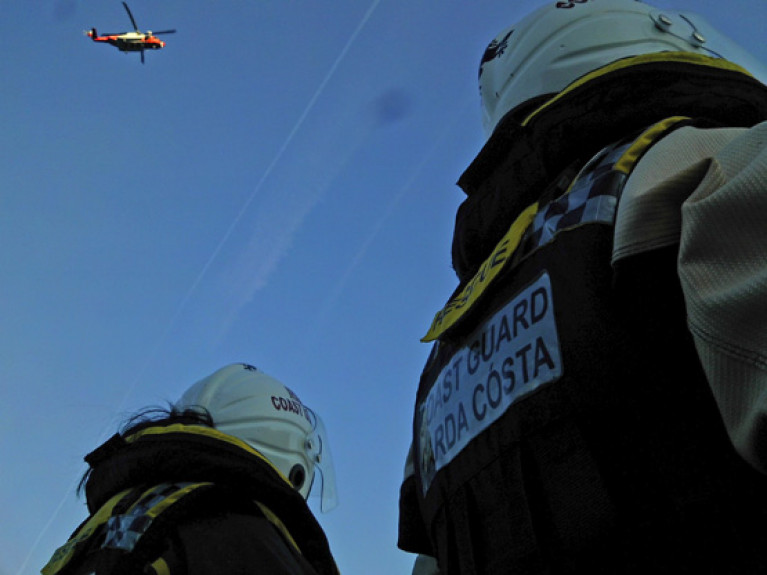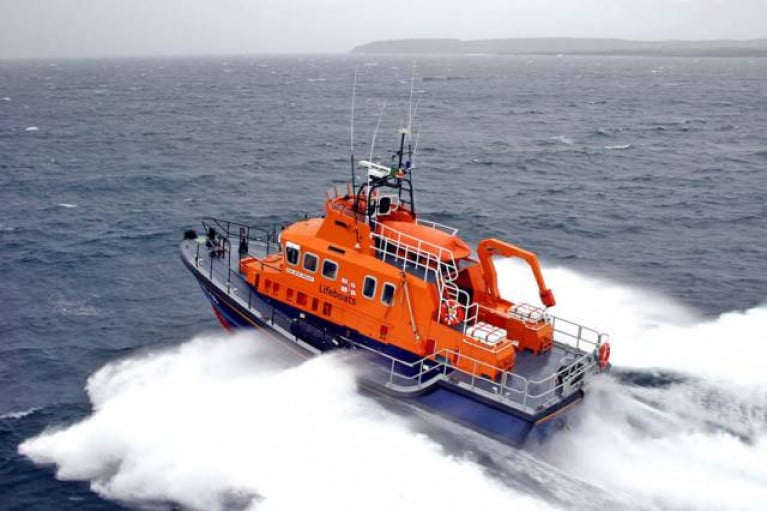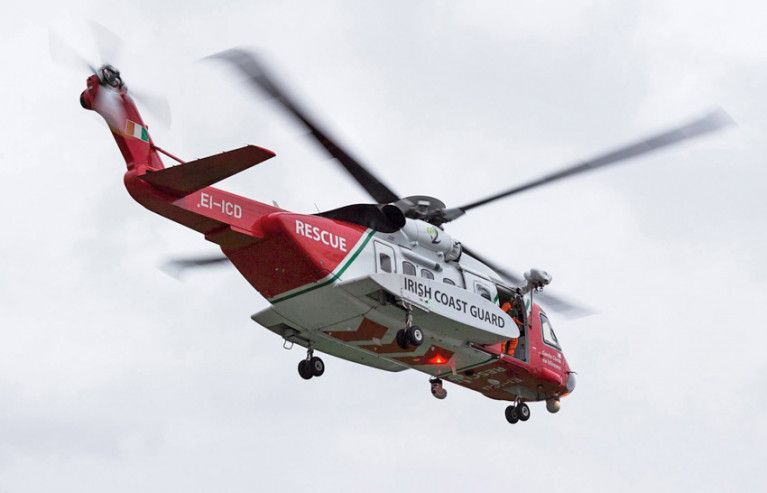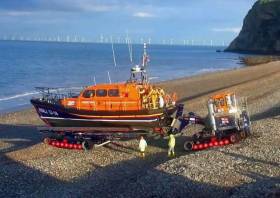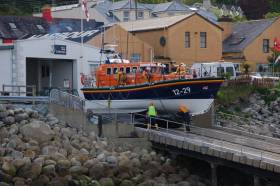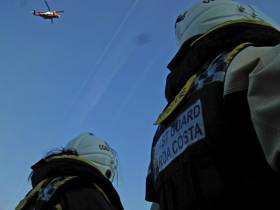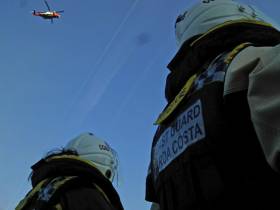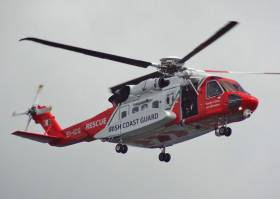Displaying items by tag: Search
RTÉ News reports that searches are ongoing in Belfast Lough today (Sunday 30 October) after claims that a man fell overboard from a docked ferry on Saturday night.
The PSNI has asked the public to avoid the area as a multi-agency response involving coastguard rescue teams from Northern Ireland and western Scotland and RNLI lifeboats resumed searching this morning.
According to the Belfast Telegraph, a rescue plane was dispatched this morning to search an area of interest, with searches focused on the area of Belfast Lough between Greenisland on the northern shore and Bangor on the southern side.
Major Search Operation For Sea Angler Missing Off Kerry Coast
Independent.ie reports that a major search and rescue operation was launched last night (Wednesday 26 August) for a sea angler on the Kerry coast.
The man reportedly fell into the water while fishing at Kerry Head.
His angling partner entered the water after him to attempt a rescue, but got into difficulty and was recovered shortly after.
Elsewhere, the body of a fisherman who went missing from his boat of Teelin in Co Donegal just hours before was found late last night.
And a young man has spoken of his role in a ‘terrifying’ rescue of a 10-year-0d boy in difficulty in the water off Com Dhíneol in West Kerry yesterday afternoon.
Twenty-two-year-old Mícheál Keogh sprang into action with another man, Dan Sullivan, to assist the boy’s two uncles in retrieving the youngster amid the strong current.
“It’s a very dangerous place to swim,” Keogh told RTÉ Radio 1’s Morning Ireland. “None of them could swim so it was mad altogether but we were able to get them out.”
TheJournal.ie has more on the story HERE.
Air Sea Search Underway for Two Missing Paddleboarders in Galway Bay
An extensive air and sea search is underway in Galway Bay after two young women who set out on stand-up paddleboards from Furbo last evening failed to return to shore.
The two women are aged 17 and 23 and from Galway, are believed to have left Furbo beach at around 8 pm on Wednesday.
The alarm was raised at 9 pm when they had not returned.
The women were wearing buoyancy aids, but not wetsuits. Sea conditions were calm but with an offshore north-westerly breeze.
The RNLI Aran island and Galway lifeboats, the Irish Coast Guard’s Shannon and Sligo-based helicopters and Doolin and Costello Coast Guards have been searching throughout the night for the two women, while local volunteers have also been combing the coastline.
Galway RNLI operations manager Mike Swan said that lifeboat crews combed the sea area throughout the night.
“The search area had focused on the inner Galway bay area and had extended west to Black Head,” he said.
Salthill Garda station is coordinating the search, working with the Irish Coast Guard and RNLI, and a meeting took place in Spiddal this morning.
The Marine Institute based in Oranmore has launched its rigid inflatable, along with a number of local craft, and the institute’s ocean sciences staff are also working on the tide and current modelling to assist the search crews.
Residents living close to the coast from Barna west to Spiddal have been asked to check the shoreline near their homes.
Update 11 am Thursday, August 13
Statement from the Irish Coast Guard on search operation for two missing females
The Irish Coast Guard Coordination centre at Valentia are currently coordinating an extensive search of Galway Bay after two females aged 17 and 23 who were paddleboarding at the time were reported overdue last night at 10:05 pm just off Furbough, Co. Galway. All available Air and Marine Rescue assets are currently being utilised in the search and the Coast Guard are liaising with An Garda Siochana at Salthill in an effort to locate the two missing females. Any sightings or information should be reported to the Coast Guard at MRSC Valentia on 112 or 999.
The Irish Times reports that a 35-year-old man was airlifted to hospital with serious spinal injuries after a diving incident in Co Cork yesterday afternoon (Monday 1 June).
It’s understood that the man was diving from rocks near Nohoval Cove, between Kinsale and Crosshaven, when his foot caught and he landed on rocks.
Kinsale RNLI and gardaí attended the scene along with the Irish Coast Guard, which airlifted the casualty on board the Shannon-based Rescue 115 helicopter to Cork University Hospital.
Elsewhere, the search resumed this morning for a five-year-old boy believed to have fallen from a dinghy on Lough Mask.
RTÉ News reports that gardaí and the coastguard are searching the west side of the lough near Toormakeady in Co Mayo.
Searches Resume For Light Aircraft Missing Over Irish Sea Off North Wales
Searches for a light aircraft that went missing between the Irish Sea and the Menai Strait off North Wales yesterday afternoon (Monday 25 November) were suspended overnight.
The aircraft, with one person on board, reportedly disappeared from radar near Puffin Island off Anglesey at lunchtime yesterday.
This prompted a major search operation that involved HM Coastguard teams from Penmon and Bangor, the coastguard helicopter from Caernarfon and RNLI lifeboats from Beaumaris, Moelfre and Llandudno.
Searches were set to resume this morning in an area around Penmon, on the opposite side of Anglesey from Holyhead.
Lifeboats from Clogherhead, Newcastle and Kilkeel were involved in the search for a woman missing in Carlingford Lough at the weekend, which came to a sad end yesterday afternoon (Monday 18 March) with the discovery of a body in the water off Greenore.
Newcastle RNLI was tasked to divert from a morning training exercise on the Co Down coast to join the major search operation which began on Sunday (17 March), concentrating on the entrance to Carlingford Lough and outlying islands.
During this search the all-weather lifeboat located a casualty in the water and, working with volunteer lifeboat crews from Clogherhead and Kilkeel RNLI, the casualty was taken ashore to Greenore Harbour by the Kilkeel lifeboat and placed in the care of An Garda Síochána.
The casualty was shortly after confirmed to be the remains of Ruth Maguire from Newcastle, who went missing during a hen party in Carlingford on Saturday night (16 March).
Speaking following the search, Newcastle RNLI coxswain Nathan Leneghan said: “On behalf of Newcastle RNLI I wish to express our deepest sympathy to the family and friends of the woman who was recovered from the water this afternoon.
“The thoughts and prayers of the everyone involved in the search are with them at this sad time. I also wish to commend the volunteer crews for their commitment and professionalism.”
Kilkeel RNLI lifeboat operations manager John Fisher added: “This was not the outcome we or the family wanted and at this difficult time our thoughts and prayers are with the family and friends of the casualty.
“At this time I would also like to thank the volunteer crew for their commitment and energy. We train for such an incident but always pray that it has a better outcome.”
Search For Angler Missing On Lough Mask
The Irish Times reports that a search is under way on Lough Mask for a fisherman who failed to return to shore yesterday (Friday 8 March).
The local man, an experienced angling enthusiast in his 70s, had set out at noon but the alarm was raised when he did not return by evening, and after weather conditions has worsened on the lake.
The man’s boat was recovered earlier today (Saturday 9 March). Gardai said searches with the Irish Coast Guard were continuing.
Search Off Galway For Missing Fisherman
#Missing - RTÉ News reports that a major air and sea rescue operation has been launched for a fisherman reported missing off Galway last night (Wednesday 22 November).
A fishing boat was found adrift with no occupant west of Blackrock in Salthill shortly after the search resumed at first light this morning.
RNLI lifeboats from Galway and the Aran Islands are involved in the search with the Shannon-based Irish Coast Guard rescue helicopter in the search, and they have since been joined by local fishing boats.
Items Found On Mayo Beach Could Belong To Missing Rescue 116 Crew
#Rescue116 - A lifejacket and helmet washed up on a beach near Blacksod in Co Mayo this weekend may belong to one of the two missing crew from the Rescue 116 tragedy earlier this year, as RTÉ News reports.
The items, which were attached together, were discovered on the shore near An Clochar yesterday morning (Saturday 30 September).
A detailed search of the area has been hampered by poor weather, with no other items found.
Winch operator Paul Ormsby and winchman Ciaran Smith have been missing since the Irish Coast Guard helicopter went down at the island of Black Rock, west of Blacksod, on 14 March.
Capt Dara Fitzpatrick was recovered at the scene but was pronounced dead in hospital shortly after. The body of Capt Mark Duffy was recovered some days later.
Elsewhere, the body of a middle-aged man was found washed up on Inis Meáin in Galway Bay last night.
RTÉ News says the discovery comes almost a fortnight to the day after a Russian national was swept into the water while sea angling near Doonbeg, some 36km south of the Aran Islands.
There was better news for the families of two fishermen feared missing in Galway Bay overnight, as the Irish Examiner reports.
Aran Islands RNLI and the Shannon-based coastguard helicopter Rescue 115 were involved in the search last night and early this morning for the pair when they were reported overdue.
But the search was called off around 10.30am when the small fishing boat, which has suffered technical issues in “challenging” conditions, returned to port under its own power.
Rescue 115 was earlier requested for a medevac from Inis Mór to University Hospital Galway.
Search Continues For Sea Angler Missing Off Clare Coast
#Missing - The search continued today (Tuesday 19 September) for a sea angler who was swept into the sea from a popular but treacherous fishing spot near Doonbeg in Co Clare at the weekend.
According to TheJournal.ie, the missing man and a friend, both Russian nationals, had been fishing at Pulleen Bay around 6.30am on Saturday morning (16 September) when he went into the water.
When his friend’s attempt at a rescue was unsuccessful, he is believed to have panicked and driven 60km way to Limerick to raise the alarm.
“This has happened in the past in Clare where non-Irish nationals fishing in very dangerous areas, who have little English or no English … panic and have driven miles upon miles, passed Garda stations and people on the road to raise the alarm,” said local journalist Pat Flynn.
Naval Service divers and local diving clubs have joined a number of Irish Coast Guard units from the area in the search, which has been hampered by poor visibility due to heavy coastal fog.
Meanwhile, as the Clare Herald reports, coastguard search teams expressed their dismay over the weekend as several groups of anglers continued to climb out to the rocky head where the missing man was swept away.



























